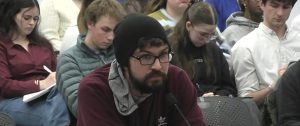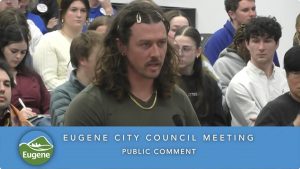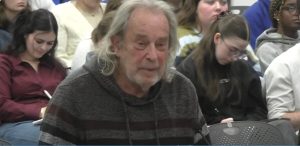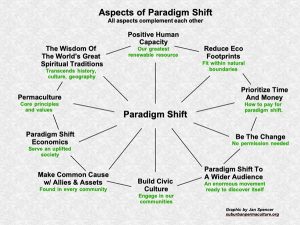Public comments to City Council: Deep decline downtown since you left
16 min read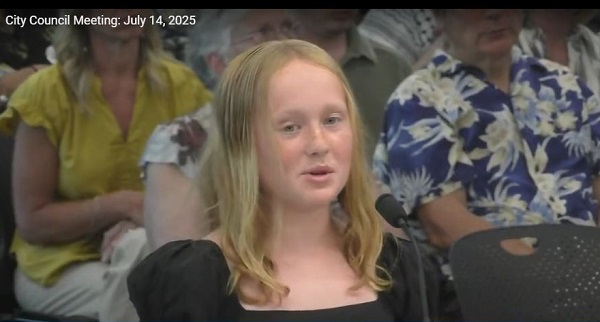
Presenter: The city council and staff may have abandoned downtown for the riverfront, but more than a dozen public comments let them know what they’ve been missing. July 14, here’s 12-year-old Vivian Bennett:
Vivian Bennett: Hi, everybody. My name is Vivian Bennett. I am here today to talk about an incident that happened downtown on Saturday, May 10. This is something that has not only bothered me but affected my perception of downtown.
[00:00:23] On this day my mom and dad brought me, my younger sister and a few of our friends to a Saturday night performance of Ballet Fantastique’s Aladdin. We parked outside of the Woolworth and walked to the Hult Center.
[00:00:35] During our walk, we encountered a rough-looking adult male that said, ‘You ladies going somewhere fancy?’ He seemed nice enough at first, but then proceeded to say, ‘You girls would look a lot better with no clothes on.’ My friends and I are 12 and my sister and her friend are 10.
[00:00:52] On our way back, we went through the Oak Street alley to get our car. We were greeted by 30 or so individuals shouting and partying next to a fire they had built in the alley. They were using open drugs and smashing beer bottles all over the ground. We were all terrified, so we held hands as a group and ran to the car, including my mom and dad.
[00:01:12] The next morning my friend woke up screaming ftom a nightmare she’d had, thinking she was being thrown into the fire they had built. She had since decided she’s no longer comfortable going downtown, even though she loves the performing arts. I’m here asking for your help to make downtown a place me and my friends want to come back to.
[00:01:29] Kelly Sutherland: I’m Kelly Sutherland. I am here wearing several hats tonight: as a nonprofit executive with ties to the business community; a public representative; and someone who is personally invested in the future of downtown Eugene.
[00:01:41] We are at a turning point. The recent daylight attack on a local businessperson, colleague, and friend, underscores growing safety concerns. A safer, more vibrant downtown matters to all of us: businesses, families, transit riders, and the broader community.
[00:01:57] We are grateful for the efforts by the city and Eugene Police, but challenges persist communitywide. Just last week, Relief Nursery experienced a theft. My husband’s downtown property faces ongoing vandalism, drug use, and trespassing incidents that frighten tenants and disrupt business. Police response can take several hours.
[00:02:18] And while some businesses rely on private security, they are still left to clean up the immediate aftermath: abandoned items, drug paraphernalia, graffiti, even human excrement. There are encouraging signs with reported crime trending downward, but many incidents go unreported and therefore those committing the crimes are not held accountable.
[00:02:37] And this creates a tremendous amount of frustration and fatigue. The impact on the community morale and downtown businesses is real. We cannot afford to be paralyzed by the complexity of the problem. This is a moment for coordinated, sustained effort. We need consistent police presence, better mental and behavioral health response, and aligned and collaborative investment in downtown safety.
[00:03:01] As an LTD board member, I know LTD plays a role in enhancing downtown. We recently committed $4 million to improve the Eugene Station, adding customer amenities and technology upgrades to support safety in and around the hub. The station also serves as the main base for LTD public safety staff. We work closely with EPD and that partnership will continue to grow.
[00:03:23] We all believe in the future of downtown Eugene, a place that honors our rich history.
[00:03:27] Eugene’s reputation for outdoor beauty, vibrant culture, and a proud Track Town college-town spirit continues to attract visitors from across the country and the world. And as tourism grows, revitalizing downtown becomes even more critical, transforming it into a hub of commerce and community.
[00:03:44] Andrea Coit: My name is Andrea Coit. I’m an attorney and I am an owner of Hutchinson Cox Law Firm. I’m here speaking on behalf of the law firm today to support our commitment to revitalizing the downtown and doing our part in that effort.
We are located in the Woolworth Building. So we are right there next to The Barn Light, across from Kesey Square, and our parking garages open up to the alleyway that is across from the LTD bus terminal.
[00:04:12] So we have, as a law firm, have to have concern not only for our city and what we can do, but also for our clients and for our employees who are coming downtown to be a part of our firm and our commitment to be in this area.
[00:04:30] So our concern, obviously, is safety. And we want, I’m here on behalf of my firm and there are many others with us here tonight to just express our commitment to join with the city of Eugene, to do what we can to make it a safer place, and to express our commitment to stay in that location, and do our part to make the city what it has been for all of us.
[00:04:53] Craig Wanichek: My name is Craig Wanichek. I’m the CEO of the 22-year-old, locally-owned Summit Bank, headquartered right in the heart of downtown Eugene. We’ve strategically chosen to be there. We’ve strategically chosen to invest in our community and that building.
[00:05:09] We want to make it a great place for our colleagues to come and work. We want to support our economy by maintaining a visible and active presence in downtown Eugene. We believe in the potential of the downtown core, and we’ve continually backed that belief with our time, our resources, and our long-term commitment to stay here.
[00:05:29] But after a member of our executive team was assaulted while walking from her car to our office on Pearl Street, right in front of the Palace Bakery at 8 a.m. on a sunny Tuesday morning, we’re having serious conversations internally, conversations about safety, responsibility to our colleagues and the future of our location.
[00:05:51] We’re not alone. Many of our peers and clients are increasingly hesitant to come downtown. The reality is business owners, employees and clients do not feel safe there. In addition to the assault we were having, people followed, yelled at, verbally threatened while walking to and from the bank. I can tell you that these are real incidents and they’re happening.
[00:06:14] They might not make a police report, but it’s happening to our colleagues and our clients. We too want to be part of the solution. We are willing to be a partner, but I also have a duty to protect our colleagues. If conditions don’t improve, we will consider selling our building and relocating to another part of town or another town.
[00:06:35] This is not a threat. It’s more a reflection of how serious the situation has really become downtown. We’re grateful to the City Manager (Sarah) Medary for reaching out and Mayor (Kaarin) Knudson for visiting our team.
But we need more than acknowledgement. We need action. A strong downtown benefits everyone. We remain hopeful that with the right focus, it can once again be a great place for our clients, our friends, and our associates to come down where they want to be, not a place to avoid.
[00:07:05] Carrie Helwig Christopher: Hello, my name is Carrie Helwig Christopher. I’m a corporate and intellectual property attorney at Hershner Hunter LLP. Our firm is located downtown at the corner of 7th and Pearl. We share the building with Cascade Title.
[00:07:18] I am speaking tonight because I care about the future of downtown Eugene, and while I have concerns for its viability and the safety of our people when they work, live, or visit downtown, I want the City Council to know that the business community showing up here tonight is here to advocate for collaboration and to be a part of the solution.
[00:07:36] Our firm made the decision to leave the downtown core and lease office space closer to privately-owned 5th Street Market a couple years ago. This decision was made in part because of the ongoing safety concerns we faced at our former building that had an alley behind it and covered parking areas where illegal activities frequently occurred.
[00:07:54] Even at our new office space, employees do not feel entirely safe, and our building management company provides private security 24-7 to assist in the event there is an unsafe or threatening situation. While I appreciate that data indicates crime rates are improving, we also know that perception is reality. And right now the reality is that people do not feel safe downtown, and I suspect that many incidents currently go unreported.
A consistent and visible safety presence—whether police, security, or cleanup crews—would make a huge difference. I’d love to understand what’s working, what could be changed, and how the business community can support this.
[00:08:36] And if there’s a role for me and other professionals working downtown to help strengthen partnerships, whether it’s through downtown associations or outreach, I’m ready to help.
[00:08:46] Ron Green: My name is Ron Green. I’m the president and CEO of Oregon Pacific Bank, and we operate a full-service banking branch on the corner of 11th and Oak in downtown Eugene. Like others, I’m here to discuss our concerns regarding downtown Eugene, particularly as it relates to the safety of our employees and customers.
[00:09:05] Unfortunately, downtown businesses have become desensitized and feel like we are forced to consider the environment acceptable. It is not. I think if you’re not familiar with Oregon Pacific Bank, some context of who we are and our investment, which is relatively new to Eugene, is relevant to our conversation and out of respect that we have a number of speakers I’m going to abbreviate my comments and submit my letter online.
[00:09:31] Oregon Pacific Bank is one of 12 state charter banks left in the state of Oregon. What that means is a bank that is headquartered here, started in Oregon; we started in Florence in 1979. We had the opportunity to migrate to Eugene with an opportunity to hire four employees in 2016.
[00:09:49] Today we have our branch on the corner of 11th and Oak, with 27 full-time employees with an annual payroll of $3.5 million. Over the last five years, we have migrated 28 jobs from Florence to Eugene with an annual payroll and benefits of $3.7 million. This is our administrative office for our company, which is now in Eugene, Oregon.
[00:10:13] We are in downtown and we are making an investment and we would like to be part of it. That investment besides the people and the payroll consists of over $8 million in investing in real estate for us to own and to operate from.
[00:10:26] Is the city of Eugene committed to doing whatever’s necessary to create an environment where businesses, their employees and customers can safely work, live, and play?
[00:10:37] Businesses operating in downtown Eugene have options, as you’ve heard this evening, and may exercise them if their employees and customers are unwilling to come downtown. I believe the viability of downtown Eugene depends on your answer to that question, and of course the actions that you take.
[00:10:57] Randall Collis: My name is Randall Collis. I’ve experienced the demise of downtown, the rebirth of downtown, the demise again of downtown. I have been a business operator in downtown since 1996 when we decided to reopen the city and actually allow businesses to thrive.
[00:11:15] I am a founding board member and the chairman of the board for John G. Shedd Institute for the Arts. I think you all know who we are, on one end of downtown, so I have had 30 years of operating a business in downtown. And I’m here tonight to say I keep being told, in multiple different roles, that it is a perception that there’s risk.
[00:11:38] And I’m telling you today that I have family members that won’t come downtown, even to my office. I have constituents at the Shedd who will not come down for evening performances out of fear of either their personal safety or damage to their vehicles. I can tell you as a individual who does come downtown at 5:30 in the morning, it’s a different animal than what you see in the afternoon.
[00:12:04] Unfortunately, the City Council now does not work downtown, so you really do not know what we face every day. And I’d really appreciate it if we could reestablish the rule of law, empower our police to do their jobs, I think without that we’re going to continue to run in the same circle and eventually businesses who do pay a lot of taxes will be moving out of downtown.
[00:12:29] Jenny Bennett: My name is Jenny Bennett. I’m here tonight to speak on behalf of our 130-member Eugene team and our clients, many of whom are deeply concerned about their safety. A few weeks ago, one of our colleagues was attacked while walking from her car to work.
[00:12:45] This incident shook us as a team, not only because it was violent and traumatic, but because it confirmed the fear that some of us have carried quietly for too long. I understand the reported crime in downtown is decreased by 6%. Thank you, police and Red Hats.
But tonight I’m here to talk about what doesn’t make the reports. I’m talking about the harassment, the broken windows, the verbal threats, and the morning walkarounds we do to clean up after overnight damage.
[00:13:11] These incidents rarely make it into the data, but they are lived experiences that are driving people away. In the past three years, we’ve seen a 40% increase in remote deposits and a 30% increase in courier. That’s not growth. It’s a retreat. Our clients are telling us with their behavior that they don’t feel safe coming downtown.
[00:13:30] Many of the businesses around us have already shut and closed their doors. This is an urgent community issue. While downtown suffers, the whole city suffers. We know that a vibrant, active downtown improves safety, but people won’t come back if they don’t feel safe. As an employer and as an executive of Summit Bank, I feel a deep responsibility to ensure our team is safe walking to and from work each day.
[00:13:54] This shouldn’t be an extraordinary ask. It should be expected. If there’s a role for Summit and our team and building stronger partnerships, we are ready.
Thank you City Manager Medary for calling and for your personal outreach after the attack. Now we need solutions and we all look forward to collaborating with this team right here to develop them.
[00:14:12] Katie Wilgus: My name is Katie Wilgus. I am representing the Eugene Area Chamber of Commerce and Downtown Eugene Inc. Through my work downtown, I see firsthand both the challenges and the potential of our city center. I’m encouraged that the number of trespassing calls responded to by our Red Hats team has slightly declined.
[00:14:34] But with that said, we’re seeing an increase in individuals who are struggling with severe mental health challenges—challenges that often go far beyond what our current resources can manage alone. Even as response numbers improve, we continue to have real experiences that challenge this positive trajectory.
[00:14:55] While it’s tempting to dismiss or downplay a single incident like the recent assault because of a larger data set that suggests incidents are declining, we have to recognize the significance of these types of experiences on the overall success of downtown. Every time someone hears of an assault sees serious vandalism witnesses, someone screaming at a family who’s trying to eat dinner.
[00:15:23] It sets us back significantly in our efforts to change people’s minds about our downtown. These events, even one-offs, dramatically impact neighborhood morale, customer behavior, investor confidence, public perception, and whether we can truly call our core ‘welcoming.’
We simply cannot dismiss these occurrences, even if the data says that they are fewer and farther between because perception is reality and our downtown is in crisis.
[00:15:56] When DEI launched the Red Hats program, we had 20 uniformed ambassadors providing visibility, support, and connection. Today due to funding constraints, we have just three. A large, visible, welcoming presence can go a long way, not only in deterring bad behavior, but reinforcing the message that downtown safety matters.
[00:16:25] I welcome the opportunity to partner with each one of you and with the broader business community to find the right path forward. I strongly believe that we can create a downtown that is safer.
[00:16:38] Sarah Cassell: I’m Dr. Sarah Cassell. I’m with Eugene Rheumatology, and I’m here to speak in support of a safe and vibrant downtown Eugene.
[00:16:47] A lot of people have spoken about this tonight, and so I want to just relay my business’s impact and perspective. We’re in the Miner Building on Broadway and we regularly have staff who feel either harassed or unsafe walking from their cars to work. I have patients who come (some from other parts of this state) downtown, some who are elderly, some who have mobility issues, and they complain about being harassed on their way to their medical care and to our office as well as feeling unsafe.
[00:17:29] And in fact, I have a number of patients who have opted not to come downtown to get their care anymore. So, I am just asking for the City Council to try to help support making downtown Eugene more safe, more vibrant, and a good place for the whole community to work and live.
[00:17:53] Michaela Marcotte: My name is Michaela Marcotte and I’m the human resources director for Summit Bank. Our colleagues’ safety and well-being is our top priority, and as a local company and community bank, we have been committed to fostering an environment that emphasizes safety in and outside of the workplace.
[00:18:11] After one of our colleagues was assaulted in broad daylight, just a few blocks from our workplace, it really impacted me as a company leader and what my responsibility and role is to help address colleague concerns and what our messaging is to help build trust and provide a safe work environment. We continually preach and practice that.
[00:18:31] It starts with open communication. We try and create an environment where everyone feels comfortable voicing their concerns, and so that is why I’m here to share that a majority of our colleagues are afraid and they’re of walking to work due to several factors of feelings of unease and fear in downtown Eugene.
[00:18:52] In addition to the personal safety class provided by Eugene Police Officer Janina Rager, we’ve also tried to address concerns by hiring a martial arts professional to give self-defense training, which will help, but we need more action to make Eugene streets safer.
We take it very seriously. It’s our obligation as business leaders to look out for our colleagues and look them in the eyes and confidently tell them we do everything we can to make them feel safe, but we can only do so much to reassure them.
[00:19:27] As I’ve mentioned, we do provide training, but it’s getting more challenging with factors that are not within our control. This is truly an urgent matter that our colleagues are afraid to walk to work, which is affecting their morale and overall psychological safety. We need your help. How can we collaborate and demonstrate accountability and moving the needle forward with solutions for improvements we can all have confidence in?
[00:19:51] Irina Pack: My name is Irina Pack and I have worked in downtown for the last nine years. And I just have three things I would like to share.
[00:19:59] So, number one, women who work in downtown are scared. I had lunch with a friend recently and we talked about how we navigate downtown. We talked about planning our outfits, making sure to wear pants, shoes that are comfortable, easy to run in. We want to feel safe.
[00:20:18] The second point is when I go to get coffee, I am typically surrounded by at least one colleague. And even then, as I pass through the Park Blocks, I have been assaulted, verbally. with comments about my appearance and my clothing. And even though these are not crimes that can be reported, these are still things that make us feel unsafe.
[00:20:42] And lastly, my office is in the US Bank tower, and over my time there, we have noticed a significant number of businesses already move out of downtown. And this affects the bagel shops, it affects the coffee shops, it affects the cafes, the small business owners. And it affects the arts organizations and it affects all of us because we are an ecosystem and we need to support one another in order to be a vibrant city.
[00:21:14] Vicky Gray: My name is Vicki Gray. I’m the senior vice president and relationship banking team leader at Oregon Pacific Bank. You’ve heard from our CEO Ron Green tonight about our company’s commitment to the economic vibrancy of downtown Eugene, a key component of which is personal safety for our employees, our visitors, and our neighbors.
[00:21:37] I agree with him wholeheartedly. On the matter of personal safety, I would like to offer that I have been working in downtown Eugene for over 21 years. During that time, we’ve experienced periods where personal safety feels more at risk than other times, but personal safety has been a persistent issue at some level for the entire period.
[00:22:01] Today we have more people traveling around the area trying to exist in limited space. Many are desperate for a safe place to sleep. Others are here to take what is not theirs. We are here tonight in support of our colleague who was recently attacked by someone willing to take what was not theirs at whatever cost.
[00:22:22] We are extremely grateful that she was not more seriously injured. We know this is not the first time this type of attack has taken place, but it has garnered the loudest response from people with a voice who recognized their privilege and are willing to use it for the common good. There are many in our community who do not share this privilege, and yet they are subject to the same risk.
[00:22:46] We must remember that their safety is important too. I believe it is our duty to use our voice, our energy, and our privilege to ensure the safety of all who choose to work, visit, and exist in our downtown area. Collectively, we are asking the city to join with local business to provide, to improve the security for all who want to work and live and enjoy our downtown.
[00:23:13] Presenter: During public comment, the City Council hears that patrons of the Hult Center and the Shedd, as well as clients, customers and employees, no longer feel safe downtown.

